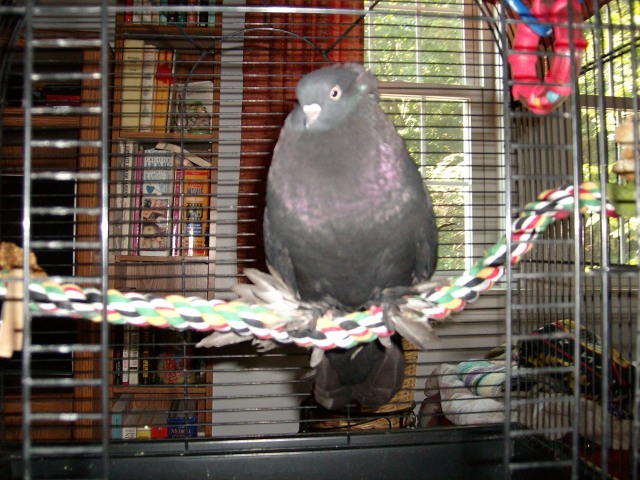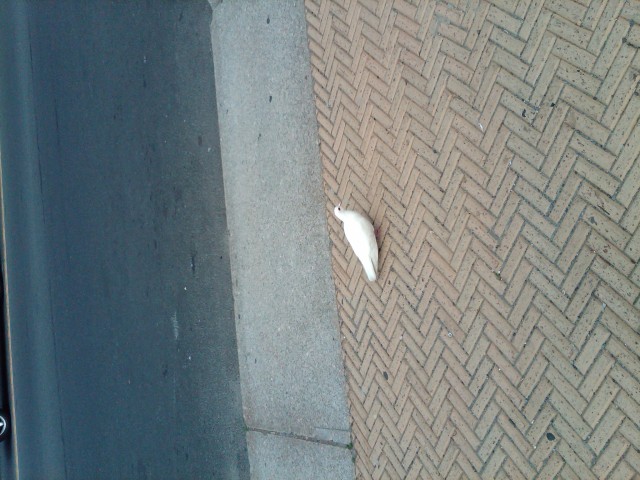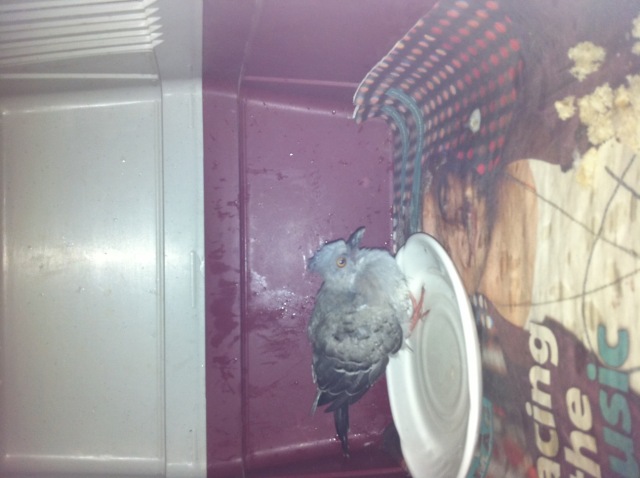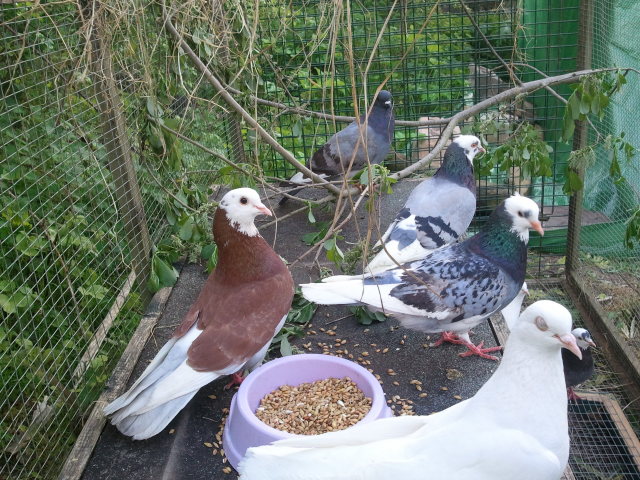Questionhi Chrys,
i think you missed the point here. the problem i got is my pigeon infertility. it might be caused by the disease and/or the thiampenicol. the disease was cured by thiampenicol in december 2005.
do you have any suggestions about the treatment that might make my pigeon recover its fertility?
thanx and i'm sorry if my words a bit confusing.
regards,
rascar
-------------------------------------------
The text above is a follow-up to ...
-----Question-----
hi Chrys,
thanx for your explanations. do you have any suggestions about the treatment that might make my pigeon recover eventually?
regards,
Rascar
-------------------------------------------
The text above is a follow-up to ...
-----Question-----
Hi Chrys, thanx for replying
If i'm not mistaken, the pigeon suffered Coccidiosis.
Friend of mine treated it with an antibiotic called Thiamphenicol.
He took Thiamphenicol 500mg capsule and made 6 pieces per capsule. The pigeon took 2 pieces per day for 3 days.
At that time my pigeon was 3 years old and now 4 years old.
Thiamphenicol did cure the disease but it left the pigeon twisting its head a bit. For a month or so, the twisting head also dissapeared naturally. But the worse effect occured as you know it.
These pigeon has suffered infertility since December 2005. All of its eggs remain clear and never hatch.
Regards,
Rascar
-------------------------------------------
The text above is a follow-up to ...
-----Question-----
hi Chrys,
I got a male pigeon (racing pigeon) from friend of mine. He told me that it struck by a disease about a year ago together with the other 3 male pigeons of his. This 4 pigeons were cured by giving them some antibiotics. Unfortunately this treatment caused a terrible effect to the pigeon. All of them cannot fertilize eggs anymore. Even we pair them up to some new excellent hens which had been proven they are fertile.
The female pigeons lay 2 eggs and they sit on it normally. But the eggs remain clear when it's supposed to hatch. I'd tried to switch the female but no success. The results remain the same. It happens to the other 3 male pigeons as well. Those pigeons are 4 years old.
Is it possible to recover my pigeon's fertility? if so, how?
thanx in advance and sorry for my terrible english.
Regard,
Rascar
-----Answer-----
Hi, Rascar. Thanks for posting!
What disease/illness did the pigeons suffer from? I don't know of any pigeon disease/illness that causes infertility. Not all eggs that are laid hatch. It could be that these eggs are not hatching for some other reason rather than infertility of the cock birds. How many eggs by this male have been laid that haven't hatched?
I need this extra information in order to try and help you.
Thanks.
Chrys
-----Answer-----
Hi again, Rascar.
If these pigeons were exhibiting the head/neck twisting symptoms, they were suffering from either paratyphoid or paramyxovirus-1 (PMV-1), not coccidiosis. Coccidiosis is an intestinal disease caused by a parasite and would not have made pigeons fertile. In fact, coccidiosis is found in nearly all pigeons and in all lofts and is easily taken care of. I'd say more likely they had PMV-1, which is a virus, nearly always resulting in the head/neck twisting. Paratyphoid cases can result in the head/neck twisting, but usually paratyphoid can be differentiated from PMV-1 by wing boils (or boils on other parts of the body). I'd say if anything, the PMV or paratyphoid is resulting in clear eggs. Paratyphoid can be cured with antibiotics, but I'm not sure the thiamphenicol was the correct antibiotics to be given (not sure thiamphenicol resolves paratyphoid bacteria).
In addition, there are many reasons why pigeon eggs don't hatch. Doesn't necessarily mean the cock birds are infertile.
Come back with any questions.
Chrys
-----Answer-----
Hi, Rascar.
Treatment depends on which disease your pigeon has/had and I don't know if your bird still has it. Does this bird have any type of wing boils (hard lumps) on it's wings? Are you finding any heavy urination spots? Read about these diseases at many internet websites. Just search using the search words "paratyphoid" or "paramyxovirus-1."
Pigeons with the twisted neck/head syndrome can have either paratyphoid or PMV (the two are often hard to differentiate). Paratyphoid is not curable, but some antibiotics are better than others in the treatment of salmonella, which starts paratyphoid (paratyphoid is a bacteria). Pigeons with paratyphoid will often have wing boils and other symptoms to distinguish it from PMV. Birds can be carriers of paratyphoid, i.e., it lies dormant and stress causes the bird to shed it via droppings. Using clorox (1 capful per 2 liters of water) in the drinking water often helps prevent the spread. PMV is a virus and the twisted neck syndrome almost always appears. Birds can recover from this, but it often takes years of vaccination each year of all birds and squeakers when they are still in the nest. The other form of PMV affects the kidneys, so the bird produces a large volume of urine.
Medications to treat your pigeon can be found here:
http://www.globalpigeon.com/
You'll need to search the website some to find the product(s) you need. You should vaccinate all your pigeons once per year against both paratyphoid and PMV-1, as well as pigeon pox if this disease is found where you live. Vaccinations are available at this website and there are medications you can give for a specific period of time to treat the diseases.
Come back with any additional questions.
Chrys
AnswerHi again, Rascar.
I think you are missing my point! Let me try to explain...
If your bird has the neck/head twisting, your bird is not cured! In fact, this bird may never recover from this disease (paratyphoid/PMV-1). The disease/illness was misdiagnosed and treated with the wrong medicine to begin with according to the reference material I have (which were written by avian veterinarians who deal specifically with pigeons). In other words, your pigeon didn't have coccidiosis, it has paratyphoid or PMV-1 (verified by the neck/head twisting). Perhaps the Thiamphenicol helped some part of a bacterial infection, but if you didn't treat the paratyphoid or PMV-1 with the proper medicine, the disease/illness still exists in your bird. The infertility in your bird could be the result of the paratyphoid or PMV-1 disease/illness still existing in your bird. I asked you to research these illnesses on the internet so you could become familiar and try to determine which illness your bird has. Since these illnesses are closely related, I asked if your bird(s) had any wing boils, etc., in order to help you determine which illness your bird(s) is suffering from so you would know the correct medicine to give to help them. Then I provided a website where you could obtain the proper medicine and vaccine in order to treat your bird properly (and vaccinate your other birds) so you could try to cure your pigeon (and keep the others from getting the same, since it can be spread from bird to bird).
Clear eggs can also be the result of other problems. In other words, perhaps the eggs weren't fertile to begin with. Just because 2 birds mate, doesn't mean the female was fertilized...this could be the result of incomplete copulation. Perhaps the male isn't producing viable sperm. Not all eggs laid are fertile and then eventually hatch after incubation...if they weren't fertile to begin with, they won't hatch. Also, the disease/illness affecting your bird can be transmitted to the eggs, therefore, if you don't cure the disease/illness in the adult bird(s), the eggs may not develop and hatch. There could also be other illness contaminating the eggs keeping them from hatching. In other words, what causes paratyphoid and PMV-1 (usually rodents or passing from bird to bird via a carrier bird) can also cause other illness, thus, not permitting proper development of embryos inside the eggs, so they won't hatch. If the eggs aren't incubated properly, they won't develop properly and hatch. And, if this problem was the result of rodents (which it usually is), you need to address the rodent problem, too, or your bird(s) and/or eggs will continue to be infected. In other words, there's as many reasons why eggs aren't fertile/don't hatch as there are birds!
So what I'm trying to say with all this is that you need to determine the true reason for the infertility problem in your bird(s) before you can fix the infertility problem. You're assuming your bird(s) are infertile due to coccidiosis, but I'm telling you coccidiosis is easily cured and would not result in infertility in your birds. There has to be another reason(s) for this infertility. I'm trying to help you determine this other reason.
If your bird was cured a year ago and all else is fine, then your bird should be able to produce fertile eggs. I'm telling you something else is amiss here and this is why eggs are clear. I have offered you reasons for why this could be happening. If you don't want to accept what I'm trying to tell you, then I can't help you. I've kept hundreds of pigeons for over 10 years, and I've seen and dealt with many pigeon illnesses/diseases. I'm not an avian veterinarian, but I do have lots of experience and knowledge of problems affecting pigeons.
Chrys

 What kind of pigeon is this?
Question
fancy pigeon?
My friend just recently left me
What kind of pigeon is this?
Question
fancy pigeon?
My friend just recently left me
 IDENTIFY THIS BIRD
Question
UNKOWN BIRD
I saw this bird among other pigeon
IDENTIFY THIS BIRD
Question
UNKOWN BIRD
I saw this bird among other pigeon
 Baby crested pigeon?
Question
Baby pidgeon
Late last night we found a little
Baby crested pigeon?
Question
Baby pidgeon
Late last night we found a little
 pigeon/dove breeds
Questionbirds
QUESTION: Hi there,
I already ha
pigeon/dove breeds
Questionbirds
QUESTION: Hi there,
I already ha